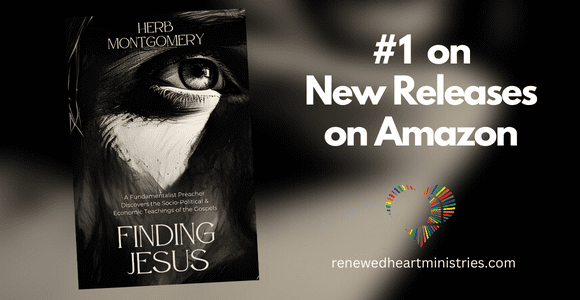
As we wrap up our series on shaping our world into a safe, compassionate, just home for everyone, let’s pick up from Kee’s statement. The wild animals and angels in this week’s story would have brought to mind the liberation of the people from oppressive world empires in Daniel Chapter 7:
“In my vision at night I looked, and there before me was one like a son of man coming with the clouds of heaven. He approached the Ancient of Days and was led into his presence. He was given authority, glory and sovereign power; all nations and peoples of every language worshiped him. His dominion is an everlasting dominion that will not pass away, and his kingdom is one that will never be destroyed. (Daniel 7:13-14)
Welcome Readers! Please subscribe to Social Jesus Here.
(Read this series from the beginning at Part 1 and Part 2.)
Speaking of one of the wild animals’ little horns, Daniel writes,
“‘But the court will sit, and his [the oppressor’s] power will be taken away and completely destroyed forever. Then the sovereignty, power and greatness of all the kingdoms under heaven will be handed over to the holy people of the Most High. His [the son of man’s] kingdom will be an everlasting kingdom, and all rulers will worship and obey him.’” (Daniel 7:26-27, italics added.)
Matthew and Luke later expand this liberation theme by referencing Daniel’s visions in one of three temptations the Satan brought to Jesus:
“Again, the devil took him to a very high mountain and showed him all the kingdoms of the world [Daniel 7’s Wild Animals] and their splendor. ‘All this I will give you,’ he said, ‘if you will bow down and worship me.’” (Matthew 4:8-9)
“The devil led him up to a high place and showed him in an instant all the kingdoms of the world. And he said to him, “I will give you all their authority and splendor; it has been given to me, and I can give it to anyone I want to. If you worship me, it will all be yours.” (Luke 4:5-7)
In Mark’s version of the wilderness temptations, these connections to Daniel 7 and liberation from empires are much more subtle.
But John’s imprisonment brings us out of the wilderness. As I shared a few weeks ago, Herod, Rome’s agent in region, was deeply threatened by John’s justice preaching and the large crowds that were starting to follow him. Josephus writes,
“John was a good man who had admonished the Jews to practice virtue and to treat each other justly, with due respect to God, and to join in the practice of baptism. John’s view was that correct behavior was a necessary preliminary to baptism, if baptism was to be acceptable to God. Baptism was not to gain pardon for sins committed but for the purification of the body, which had already been consecrated by righteousness. Herod became alarmed at the crowds that gathered around John, who aroused them to fever pitch with his sermons. Eloquence that had such a powerful effect on people might lead to sedition, since it seemed that the people were prepared to do everything he recommended.” (Josephus, History of the Jews, 18:116-119)
Once John is arrested, Jesus begins his own preaching of the gospel of the arrival of God’s just world named in Mark as “the kingdom.” Remember the gospel was a term used in the Roman empire (see The Gospel Jesus Taught). Myers explains:
“Roman propaganda focused on eulogizing Caesar as the ‘divine man.’ This ideological strategy is well documented in coins of the period, and of course in the later emperor cults of Asia Minor. The ascension to power of a new ruler was cause for ‘glad tidings,’ and celebrations and sacrifices always followed . . . [Deification of the emperor] gives euangelion [Rome’s gospel] its significance and power . . . Because the emperor is more than a common man, his ordinances are glad messages and his commands are sacred writings . . . He proclaims euangelia [gospel, glad tidings] through his appearance . . . the first euangelium is the news of his birth. As one ancient inscription puts it, ‘The birthday of the god was for the world the beginning of the joyful messages which have got forth because of him.’” (Binding the Strong Man, p. 123)
The gospel was a term from the Roman Empire. Once one begins to delve into Roman Caesar worship, it becomes beautifully obvious how Mark’s gospel was juxtaposing Jesus with Caesar and offering Jesus’ gospel of the kingdom as resistance, an alternative to the gospel of Rome, the peace of a just world contrasted with the pax Romana.
Jesus’ gospel of the kingdom was much more concerned with our concrete realities in this life than the afterlife. The socio-political and economic implications of Jesus gospel are profound and often overlooked. The kingdom has been twisted today to be mostly religious in nature, but for the early Jesus followers, Jesus gospel was political. By “political,” I mean how we choose to share space together here on earth.
Jesus was announcing a just world that had “come near.” It had arrived and Jesus traversed the margins and edges of his society inviting all to be a part of it. Jesus’ just world expressed a profound concern for justice, compassion and the well-being of those the present system marginalized. His gospel still calls us to that today.
Jesus’ gospel calls us to a more socially compassionate, socially just expression of Christianity. His gospel still has the power to radically impact how we choose to practice our Christianity today. Are we so heavenly minded that we are no earthly good? Or do we perceive in the Jesus story a life-giving path that informs us to take up the work of making our world a safe, compassionate just home for everyone?
Herb’s latest book, Finding Jesus: A Fundamentalist Preacher Discovers the Soci0-Political and Economic Teachings of the Gospels is #1 New Release available now on Amazon.















